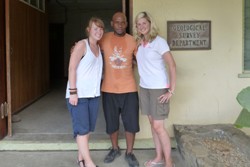
FUTURE PLANS
Where does Geology for Global Development go from here? Plans begin with expanding and developing our GfGD University Groups. As these multiply, so must GfGD’s capacity to support their development; and so a National Committee comprising students and recent graduates will be established. A UK-based conference, aimed at gathering members from across our various university groups, is also on the agenda.
Image: Solomon Islands – University of Leicester Students working closely with the Geological Survey in a knowledge exchange program (Image courtesy Sarah Hey, University of Leicester)
Another of our aims is to establish UK-based summer placements through our relationships with NGOs – so putting geoscientists at the heart of the development sector. Such opportunities will help students cement their understanding of how development works from both policy and practitioner perspectives. Students will have the chance to consider if and how geoscience is used within this work, and so look for ways to improve its understanding among development practitioners.
The development of an overseas placement scheme will give students and recent graduates the chance to spend time working in less developed countries, fostering both soft and technical skills, and gaining important experience for career development. Placements will involve close collaboration with host country universities, governments and charitable organisations. This emphasis on strengthening technical capacity brings real benefit to host countries from the dialogue, skill sharing and knowledge exchange that is thereby fostered.
Finally, as always with an initiative such as this, there is the challenge of fundraising. The programme proposed by GfGD is ambitious, and many future initiatives will involve securing serious financial backing. We expect that university groups will play a role through organising fundraising events; and as well as making applications to grant-making bodies, we intend to establish opportunities for private sector sponsorship.
By getting involved in the activities of GfGD we hope that many students will begin to engage with the question of how to work effectively in other cultures, making projects more sustainable and reducing vulnerability through the improved communication of geoscience. There are many individuals and groups within the geosciences that have worked to share their knowledge and skills with those less fortunate - a far from straightforward task. What has been lacking so far, however, is a forum for young people - students and recent graduates - to get involved, and develop skills and experience. Geology for Global Development has an ambitious plan to help fill that gap - and in so doing, join the fight against global poverty.